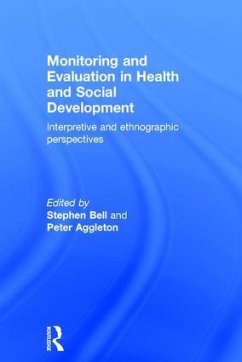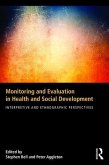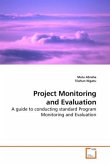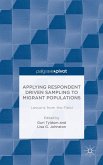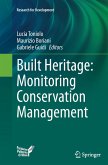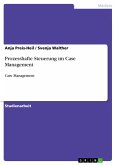Monitoring and Evaluation in Health and Social Development
Interpretive and Ethnographic Perspectives
Herausgeber: Bell, Stephen; Aggleton, Peter
Monitoring and Evaluation in Health and Social Development
Interpretive and Ethnographic Perspectives
Herausgeber: Bell, Stephen; Aggleton, Peter
- Gebundenes Buch
- Merkliste
- Auf die Merkliste
- Bewerten Bewerten
- Teilen
- Produkt teilen
- Produkterinnerung
- Produkterinnerung
Current approaches to Monitoring and Evaluation (M&E) in health and social development are often expensive and are conducted in order to demonstrate success, rather than to learn how change occurs and what works within a particular context. Responding to these concerns, this book will illustrate the potential of interpretative methods to aid understanding and make a difference on the ground. Through a focus on individual and community perspectives, and locally-grounded explanations, the ethnographically-informed methods explored in this book offer a potentially richer way of assessing the…mehr
Andere Kunden interessierten sich auch für
![Monitoring and Evaluation in Health and Social Development Monitoring and Evaluation in Health and Social Development]() Monitoring and Evaluation in Health and Social Development60,99 €
Monitoring and Evaluation in Health and Social Development60,99 €![Project Monitoring and Evaluation Project Monitoring and Evaluation]() Mulu AbrahaProject Monitoring and Evaluation38,99 €
Mulu AbrahaProject Monitoring and Evaluation38,99 €![Applying Respondent Driven Sampling to Migrant Populations Applying Respondent Driven Sampling to Migrant Populations]() G. TyldumApplying Respondent Driven Sampling to Migrant Populations38,99 €
G. TyldumApplying Respondent Driven Sampling to Migrant Populations38,99 €![Preventive Mental Health at School Preventive Mental Health at School]() Gayle L. MacklemPreventive Mental Health at School75,99 €
Gayle L. MacklemPreventive Mental Health at School75,99 €![Implementation Monitoring and Process Evaluation Implementation Monitoring and Process Evaluation]() Ruth P. SaundersImplementation Monitoring and Process Evaluation93,99 €
Ruth P. SaundersImplementation Monitoring and Process Evaluation93,99 €![Built Heritage: Monitoring Conservation Management Built Heritage: Monitoring Conservation Management]() Built Heritage: Monitoring Conservation Management98,99 €
Built Heritage: Monitoring Conservation Management98,99 €![Prozesshafte Steuerung im Case Management Prozesshafte Steuerung im Case Management]() Svenja WaltherProzesshafte Steuerung im Case Management17,95 €
Svenja WaltherProzesshafte Steuerung im Case Management17,95 €-
-
-
Current approaches to Monitoring and Evaluation (M&E) in health and social development are often expensive and are conducted in order to demonstrate success, rather than to learn how change occurs and what works within a particular context. Responding to these concerns, this book will illustrate the potential of interpretative methods to aid understanding and make a difference on the ground. Through a focus on individual and community perspectives, and locally-grounded explanations, the ethnographically-informed methods explored in this book offer a potentially richer way of assessing the relationships between intent, action and change in health and social development.
Produktdetails
- Produktdetails
- Verlag: Routledge
- Seitenzahl: 276
- Erscheinungstermin: 5. Februar 2016
- Englisch
- Abmessung: 240mm x 161mm x 19mm
- Gewicht: 581g
- ISBN-13: 9781138844155
- ISBN-10: 1138844152
- Artikelnr.: 43751949
- Herstellerkennzeichnung
- Libri GmbH
- Europaallee 1
- 36244 Bad Hersfeld
- gpsr@libri.de
- Verlag: Routledge
- Seitenzahl: 276
- Erscheinungstermin: 5. Februar 2016
- Englisch
- Abmessung: 240mm x 161mm x 19mm
- Gewicht: 581g
- ISBN-13: 9781138844155
- ISBN-10: 1138844152
- Artikelnr.: 43751949
- Herstellerkennzeichnung
- Libri GmbH
- Europaallee 1
- 36244 Bad Hersfeld
- gpsr@libri.de
Stephen Bell is a senior research fellow at the Kirby Institute, UNSW Australia, where he undertakes qualitative and ethnographic sexual health research with young people and other marginalised populations in rural and remote settings. His current interests involve examining how youth-led design of culturally and socially attuned sexual health programmes might evolve from, and be centred on, young people's own everyday strategies of sexual health risk assessment and harm reduction. Peter Aggleton is Scientia Professor in Education and Health in the Centre for Social Research in Health at UNSW Australia, where he is also Director of the Arts and Social Sciences Practical Justice Initiative. He has worked internationally in health and development for over 30 years, with a focus on health education and health promotion. He is an adjunct professor in the Australian Research Centre in Sex, Health and Society at La Trobe University, Australia, and holds visiting professorial positions at the UCL Institute of Education in London, UK, and at the University of Sussex, UK. Alongside his academic work, Peter has served as a senior adviser to numerous international agencies including UNAIDS, UNESCO, UNICEF and WHO.
1. Interpretive and Ethnographic Perspectives - Alternative Approaches to
Monitoring and Evaluation Practice Part 1: The Present Challenge 2. The
Political Economy of Evidence: Personal Reflections on the Value of the
Interpretive Tradition and its Methods 3. Measurement, Modification and
Transferability: Evidential Challenges in the Evaluation of Complex
Interventions 4. What Really Works? Understanding the Role of 'Local
Knowledges' in the Monitoring and Evaluation of a Maternal, Newborn and
Child Health Project in Kenya PART 2: Programme Design 5. Permissions,
Vacations and Periods of Self-regulation: Using Consumer Insight to Improve
HIV Treatment Adherence in Four Central American Countries 6. Generating
Local Knowledge: A Role for Ethnography in Evidence-based Programme Design
for Social Development 7. Interpretation, Context and Time: An
Ethnographically Inspired Approach to Strategy Development for Tuberculosis
Control in Odisha, India 8. Designing Health and Leadership Programmes for
Young Vulnerable Women Using Participatory Ethnographic Research in
Freetown, Sierra Leone Part 3: Monitoring Processes 9. Using Social Mapping
Techniques to Guide Programme Redesign in the Tingim Laip HIV Prevention
and Care Project in Papua New Guinea 10. Pathways to Impact: New Approaches
to Monitoring and Improving Volunteering for Sustainable Environmental
Management 11. Ethnographic Process Evaluation: A Case Study of an HIV
Prevention Programme with Injecting Drug Users in the USA 12. Using the
Reality Check Approach to Shape Quantitative Findings: Experience from
Mixed Method Evaluations in Ghana and Nepal Part 4: Understanding Impact
and Change 13. Innovation in Evaluation: Using SenseMaker to Assess the
Inclusion of Smallholder Farmers in Modern Markets 14. The Use of the Rapid
PEER Approach for the Evaluation of Sexual and Reproductive Health
Programmes 15. Using Interpretive Research to Make Quantitative Evaluation
More Effective: Oxfam's Experience in Pakistan and Zimbabwe 16. Can
Qualitative Research Rigorously Evaluate Programme Impact? Evidence from a
Randomised Controlled Trial of an Adolescent Sexual Health Programme in
Tanzania
Monitoring and Evaluation Practice Part 1: The Present Challenge 2. The
Political Economy of Evidence: Personal Reflections on the Value of the
Interpretive Tradition and its Methods 3. Measurement, Modification and
Transferability: Evidential Challenges in the Evaluation of Complex
Interventions 4. What Really Works? Understanding the Role of 'Local
Knowledges' in the Monitoring and Evaluation of a Maternal, Newborn and
Child Health Project in Kenya PART 2: Programme Design 5. Permissions,
Vacations and Periods of Self-regulation: Using Consumer Insight to Improve
HIV Treatment Adherence in Four Central American Countries 6. Generating
Local Knowledge: A Role for Ethnography in Evidence-based Programme Design
for Social Development 7. Interpretation, Context and Time: An
Ethnographically Inspired Approach to Strategy Development for Tuberculosis
Control in Odisha, India 8. Designing Health and Leadership Programmes for
Young Vulnerable Women Using Participatory Ethnographic Research in
Freetown, Sierra Leone Part 3: Monitoring Processes 9. Using Social Mapping
Techniques to Guide Programme Redesign in the Tingim Laip HIV Prevention
and Care Project in Papua New Guinea 10. Pathways to Impact: New Approaches
to Monitoring and Improving Volunteering for Sustainable Environmental
Management 11. Ethnographic Process Evaluation: A Case Study of an HIV
Prevention Programme with Injecting Drug Users in the USA 12. Using the
Reality Check Approach to Shape Quantitative Findings: Experience from
Mixed Method Evaluations in Ghana and Nepal Part 4: Understanding Impact
and Change 13. Innovation in Evaluation: Using SenseMaker to Assess the
Inclusion of Smallholder Farmers in Modern Markets 14. The Use of the Rapid
PEER Approach for the Evaluation of Sexual and Reproductive Health
Programmes 15. Using Interpretive Research to Make Quantitative Evaluation
More Effective: Oxfam's Experience in Pakistan and Zimbabwe 16. Can
Qualitative Research Rigorously Evaluate Programme Impact? Evidence from a
Randomised Controlled Trial of an Adolescent Sexual Health Programme in
Tanzania
1. Interpretive and Ethnographic Perspectives - Alternative Approaches to
Monitoring and Evaluation Practice Part 1: The Present Challenge 2. The
Political Economy of Evidence: Personal Reflections on the Value of the
Interpretive Tradition and its Methods 3. Measurement, Modification and
Transferability: Evidential Challenges in the Evaluation of Complex
Interventions 4. What Really Works? Understanding the Role of 'Local
Knowledges' in the Monitoring and Evaluation of a Maternal, Newborn and
Child Health Project in Kenya PART 2: Programme Design 5. Permissions,
Vacations and Periods of Self-regulation: Using Consumer Insight to Improve
HIV Treatment Adherence in Four Central American Countries 6. Generating
Local Knowledge: A Role for Ethnography in Evidence-based Programme Design
for Social Development 7. Interpretation, Context and Time: An
Ethnographically Inspired Approach to Strategy Development for Tuberculosis
Control in Odisha, India 8. Designing Health and Leadership Programmes for
Young Vulnerable Women Using Participatory Ethnographic Research in
Freetown, Sierra Leone Part 3: Monitoring Processes 9. Using Social Mapping
Techniques to Guide Programme Redesign in the Tingim Laip HIV Prevention
and Care Project in Papua New Guinea 10. Pathways to Impact: New Approaches
to Monitoring and Improving Volunteering for Sustainable Environmental
Management 11. Ethnographic Process Evaluation: A Case Study of an HIV
Prevention Programme with Injecting Drug Users in the USA 12. Using the
Reality Check Approach to Shape Quantitative Findings: Experience from
Mixed Method Evaluations in Ghana and Nepal Part 4: Understanding Impact
and Change 13. Innovation in Evaluation: Using SenseMaker to Assess the
Inclusion of Smallholder Farmers in Modern Markets 14. The Use of the Rapid
PEER Approach for the Evaluation of Sexual and Reproductive Health
Programmes 15. Using Interpretive Research to Make Quantitative Evaluation
More Effective: Oxfam's Experience in Pakistan and Zimbabwe 16. Can
Qualitative Research Rigorously Evaluate Programme Impact? Evidence from a
Randomised Controlled Trial of an Adolescent Sexual Health Programme in
Tanzania
Monitoring and Evaluation Practice Part 1: The Present Challenge 2. The
Political Economy of Evidence: Personal Reflections on the Value of the
Interpretive Tradition and its Methods 3. Measurement, Modification and
Transferability: Evidential Challenges in the Evaluation of Complex
Interventions 4. What Really Works? Understanding the Role of 'Local
Knowledges' in the Monitoring and Evaluation of a Maternal, Newborn and
Child Health Project in Kenya PART 2: Programme Design 5. Permissions,
Vacations and Periods of Self-regulation: Using Consumer Insight to Improve
HIV Treatment Adherence in Four Central American Countries 6. Generating
Local Knowledge: A Role for Ethnography in Evidence-based Programme Design
for Social Development 7. Interpretation, Context and Time: An
Ethnographically Inspired Approach to Strategy Development for Tuberculosis
Control in Odisha, India 8. Designing Health and Leadership Programmes for
Young Vulnerable Women Using Participatory Ethnographic Research in
Freetown, Sierra Leone Part 3: Monitoring Processes 9. Using Social Mapping
Techniques to Guide Programme Redesign in the Tingim Laip HIV Prevention
and Care Project in Papua New Guinea 10. Pathways to Impact: New Approaches
to Monitoring and Improving Volunteering for Sustainable Environmental
Management 11. Ethnographic Process Evaluation: A Case Study of an HIV
Prevention Programme with Injecting Drug Users in the USA 12. Using the
Reality Check Approach to Shape Quantitative Findings: Experience from
Mixed Method Evaluations in Ghana and Nepal Part 4: Understanding Impact
and Change 13. Innovation in Evaluation: Using SenseMaker to Assess the
Inclusion of Smallholder Farmers in Modern Markets 14. The Use of the Rapid
PEER Approach for the Evaluation of Sexual and Reproductive Health
Programmes 15. Using Interpretive Research to Make Quantitative Evaluation
More Effective: Oxfam's Experience in Pakistan and Zimbabwe 16. Can
Qualitative Research Rigorously Evaluate Programme Impact? Evidence from a
Randomised Controlled Trial of an Adolescent Sexual Health Programme in
Tanzania

